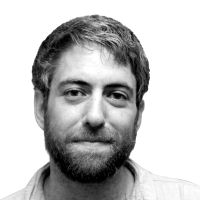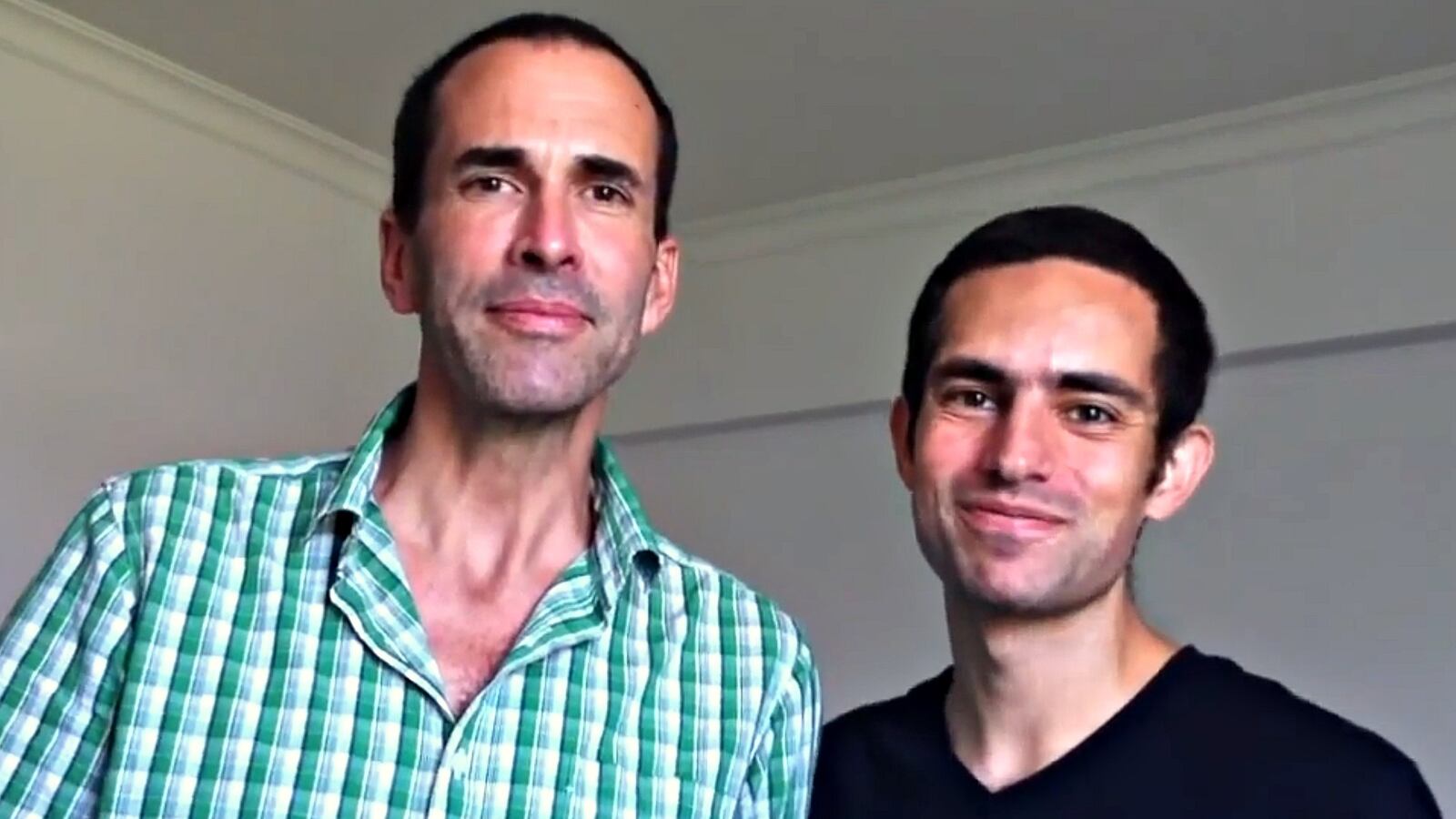Reporter Jesse Rosenfeld interviewed Canadian filmmaker John Greyson at a Cairo hotel on Sunday, immediately following his release from Egypt's notorious Tora Prison, where he and fellow Canadian Tarek Loubani were held for 51 days. Greyson and Loubani, a physician, were caught up in a mass arrest carried out by security forces on August 16. They were held without charge while their lawyers and Canadian diplomats struggled to have them released. This interview was embargoed pending their departure from Egypt, which was delayed when the authorities placed them on a no-fly list pending further investigation into alleged crimes. The two men were finally able to leave the country on Friday morning.
CAIRO—Buckling under international pressure and domestic attention, Egypt’s military-backed government freed filmmaker John Greyson and medical doctor Tarek Loubani from Cairo’s Tora prison at 1:30 a.m. last Sunday. After 51 days of detention, the surprise decision to release the two Canadians seems to have come from the top. They were arrested at Cairo's Ramses Square on August 16, caught up in the dragnet of a mass arrest carried out by the military.

Skinny and worn out from their imprisonment and 20-day hunger strike, Greyson and Loubani wandered the Novotel Airport Hotel lobby and patio, overjoyed that they could walk outside freely, basking in the sunlight.
“We knew something was up when the guards came to our cell in the middle of the night and told us we were being moved to another prison,” said Greyson, describing an emotional parting with his cellmates. “After all that time together it’s like we became one big family in there and we were the first to be released,” he added, noting with amazement that despite the deplorable conditions, frustrations between prisoners never went further than yelling.
First kept in a cramped cell of 36 people and then a smaller cell of eight, Greyson, tongue in cheek, refers to his cells as “36 Tora and 8 Tora” as if they were upscale street addresses. But the humor is a thin veneer that masks the trauma he endured with Loubani and their cellmates. “You never had any time alone, only when you were taking a shit or a shower,” said Greyson. At the side of a desolate concrete cell, the only solitary space was behind a makeshift curtain that dangled over a squat toilet next to a tap, the cell’s sole source of water.
“Our cells were called ‘the Brotherhood cells’ but apart from three former ministers from [deposed President Mohammad] Morsi’s government, most of the people had come out to protest the coup. He added, “For many of them it was their first demonstration.”
Greyson walked slightly hunched over, as we strolled around the hotel and airport area. “It’s just so wonderful to be able to get some exercise,” he exclaimed, referring to the denial of regular exercise breaks during most of his detention. As we sauntered into a construction area of low-rise white buildings, Greyson stopped dead in his tracks and abruptly turned around. “Guess I’m just drawn to cell blocks,” he said jokingly before heading in the direction of a patch of grass and the swimming pool.
Witnesses to a massacre
We wandered without direction while Greyson described the chaos of arriving in Cairo on August 14 as the massacres in Rabaa and Nada squares were underway. It was then that he and Loubani realized the border to Gaza, their end destination, was sealed. Loubani intended to continue his program training ER doctors and Greyson was researching a film about Loubani’s work. He also wanted to explore issues of queer identity in the coastal strip under Israeli blockade.
Finding the gates to a manicured garden locked, we walked down a long leafy palm-dotted road island as Greyson chronicled the blood he saw spilled on August 16 and the abuse people experienced in prison. The two Canadians were staying in a hotel right near Ramses Square when the army crackdown on anti-coup protests in the area intensified. Loubani and Greyson found themselves inside the Fateh Mosque, which had become an ad hoc sanctuary, field hospital and morgue.
“I will never forget what I saw,” said Greyson. “There were bodies everywhere, of all kinds of people. Unarmed women and men of all ages with bullet wounds were strewn across the floor. So Tarek and I did what we do. He immediately began treating people while I filmed and served as Tarek’s impromptu field nurse.”
Leaving the mosque around 7:00 p.m. as the army-enforced curfew went into effect, Greyson and Loubani found all the routes to their hotel blocked by the military. “When we got to the third checkpoint in Garden City we were taken aside by security forces, questioned and arrested.” From there, Greyson said the two were taken to a plush security forces office where a camera was set up to record them.
“They put us in front of the camera next to a Syrian national, saying ‘see we’ve caught the international terrorists responsible’,” he said. Greyson and Loubani knew the Egyptians intended to use the video as propaganda. But Greyson was amused to see that their captors did not know how to use the camera. “Tarek had to show them where the record button was and so when they gave him the mic to capture our voices, he flipped it on and off through the recording to make the sound inaudible.”
Following the attempt to film confessions, Greyson said the two were crammed into a large police truck along with dozens of others picked up in Ramses Square. From there they were driven to Cairo’s infamous Tora Prison.
A detailed boot print etched on his back
“When we got to the prison, we were made to run through a gauntlet of guards who were lined up. They beat us on the back of our heads and kidneys. They targeted places that would maximize pain but not leave marks,” Greyson said in a matter-of-fact manner. From there he said everyone was herded into a canteen where they were forced to sit on the floor, had their heads shaved and were individually singled out for intense beatings.
“That’s when the guards started screaming ‘Canadies’ as they beat Tarek and me. I got a bruise in the shape of a detailed boot print etched in my back. I spent some time trying to imagine and draw it from descriptions by Tarek and [Canadian] embassy staff. I couldn’t see it because we didn’t have mirrors in jail,” Greyson said.
The two were then thrown into "Tora 36," where injured prisoners had to compete with cockroaches for cramped concrete floor space.
The two men witnessed torture in the prison. “When we were moved to Tora 8 you could hear vomiting all night coming from cells across the hall,” he said. He went on to describe how guards would force inmates accused of taking drugs to drink water until they were sick. In another instance Greyson described being led past an interrogation room with the door left open and two men being beaten mercilessly while a third, with an open wound on his head, lay passively on the floor awaiting his beating.
Solidarity between prisoners
It was under these conditions that Loubani and Greyson launched a hunger strike on September 16, demanding to be tried or freed. “The only time I have ever agreed with Stephen Harper,” Greyson said of Canada’s Conservative Prime Minister, “is when he said Egyptian authorities have to either try us or free us.”
Greyson believes that the Egyptians chose to release them in part because, if they were put on trial, their footage from the horrors inside the Fateh Mosque would enter into evidence. As it stands now, he is convinced he will never see the confiscated footage again.
Despite the traumatic events, Greyson listed countless examples of solidarity among the inmates and individual acts of kindness. He described prisoners sharing the food their families brought, not differentiating between those affiliated with the Muslim Brotherhood and those who were not. They also shared advice and strategy for dealing with their situation.
In one instance Greyson described the collective effort of his cellmates to bribe the prison guards with cigarettes to rig up a makeshift shower. Meanwhile, Loubani became the jailhouse doctor, giving medical advice to prisoners and guards alike. “People would walk up to Tarek and ask him about what to do about ear aches or burns they had,” said Greyson.
Smuggling messages out of jail
The men were denied phone access and only allowed one weekly 15-minute visit (they were supposed to be only 10 minutes long, but the guards allowed an additional five). The time was shared between the Canadian embassy and Greyson and Loubani’s lawyers, so the two had to develop a complex communication system with the outside world.
“It was like an absurd system of broken telephone, where we would get a message from people outside and then have to send a message back through several people,” said Greyson. He described how, in order to get written statements out of the prison, they first had to smuggle it in Loubani’s underwear.
This daunting daily reality of restriction, deprivation and isolation began to change for the two last Wednesday after Loubani’s father, Mahmoud, visited the prison and then the Ministry of Interior. Mahmoud Loubani said that during the visit to the ministry he was patched through on speaker phone to an Egyptian government cabinet meeting. While on the line, he said General el-Sisi committed to freeing the two within a week.
“El-Sisi promised me I would not leave Egypt without my son,” said Loubani's soft-spoken father, sitting with Greyson and his son at the Cairo hotel.
A friendship forged in prison
Greyson and Loubani hardly knew one other when they began this journey. They met last year at the Toronto Palestine International Film Festival and connected over a shared commitment to Gaza and Palestinian rights. Greyson had tried in 2011 to reach the coastal Palestinian territory on the failed second flotilla attempt from Athens, which Greek authorities prevented from departing Athens Port. Loubani, who is of Palestinian descent, had regularly traveled to Gaza City from Egypt for a teaching and training program with Al-Shifa hospital. Now, after their ordeal in Egypt, Greyson said the two are like family. Tarek's father is only 10 years older than Greyson, but the filmmaker refers to him as “Mr. Loubani.” He, in turn, refers to Greyson as one of his sons. Even when conditions made things tense for the jailed Canadians, Greyson said they argued as families argue.
As we made our way back to the hotel, the relief was visible on Greyson's face. Then, a block away from the hotel, he stopped and turned to me. As he described the case of his cellmate Ibrahim Dewari, the determination to help those he left behind resurfaced. “He is a well known freelancer who has focused on Gaza. He was jailed simply because he appeared on a talk show to discuss the coup,” he said with a hint of earnestness.
“Everyone we were in the cell with experienced what we did and must be released.”






